2023
 Professor Amrita Ahluwalia among world's most highly cited researchers
Professor Amrita Ahluwalia among world's most highly cited researchers
17 November 2023
Researchers from Queen Mary University of London have been recognised for ranking in the top 1% by citations in their field for 2023.
 NIHR Barts BRC and CRF MSK programme celebrates EULAR Centre of Excellence Award
NIHR Barts BRC and CRF MSK programme celebrates EULAR Centre of Excellence Award
17 November 2023
The NIHR Barts Biomedical Research Centre (BRC) and NIHR Barts Clinical Research Facility (CRF) marked a key moment on Tuesday November 7th at the Graduate Centre, Mile End Campus, as they celebrated the inclusion of Musculoskeletal (MSK) research into the BRC programme and recognised the newly awarded EULAR Centre of Excellence status.
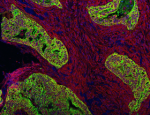 World Pancreatic Cancer Day: research reveals molecules that alter the disease’s spread
World Pancreatic Cancer Day: research reveals molecules that alter the disease’s spread
16 November 2023
This World Pancreatic Cancer Day, researchers at the Barts Cancer Institute (BCI) and the William Harvey Research Institute at Queen Mary University of London have published findings that could offer new possibilities for early diagnosis and treatment of pancreatic cancer. The scientists discovered that cells neighbouring the tumour produce a class of molecules called SPMs, which may alter how aggressive the disease is. These insights shed new light on how we might tackle this challenging cancer type. This work was made possible thanks to funding from Barts Charity and the Pancreatic Cancer Research Fund.
 New injection-based treatment reduces high blood pressure
New injection-based treatment reduces high blood pressure
13 November 2023
A new study led by researchers from Queen Mary University of London and Barts Health NHS Trust shows a novel drug called Zilebesiran given as injection under the skin once every three or six months, successfully reduces high blood pressure (hypertension).
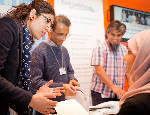 Trust is the most important factor for British South Asians when taking part in genetic research to tailor medications
Trust is the most important factor for British South Asians when taking part in genetic research to tailor medications
1 November 2023
A study led by Dr Emma Magavern from the Centre of Clinical Pharmacology and Precision Medicine at Queen Mary University of London has gathered detailed insights from the British South Asian community that could lead to more successful implementation of genetic testing to help tailor the use of routine medications.
-expression-on-its-cell-surface-150x115.png) Researchers identify a receptor that allows killer T lymphocytes to work - Potential for diabetes and immune disorder treatments
Researchers identify a receptor that allows killer T lymphocytes to work - Potential for diabetes and immune disorder treatments
26 October 2023
A new study led by researchers at Queen Mary University of London, published in the journal Nature Metabolism, has uncovered a receptor that plays a crucial role in enabling killer T lymphocytes to function effectively.
 Improving the diagnosis and treatment of growth disorders in children
Improving the diagnosis and treatment of growth disorders in children
28 September 2023
Growth is a strong indicator of health and well-being in children, but delays in the diagnosis of growth disorders are common in the UK. We spoke to Helen L. Storr, Professor of Paediatric Endocrinology at Queen Mary University of London, about her research on growth disorders in children.
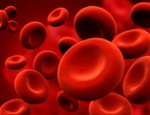 Women given new insight into blood clot risk
Women given new insight into blood clot risk
19 September 2023
New research from Queen Mary University of London, published in iScience, shows an increased risk of blood clots in women who have any combination of a particular gene mutation, oestrogen use, or common medical conditions – specifically: obesity, high blood pressure, high cholesterol, and kidney disease.
 Unlocking the genetic mysteries of blood pressure: new research identifies potential causal genes and drug targets
Unlocking the genetic mysteries of blood pressure: new research identifies potential causal genes and drug targets
8 September 2023
Scientists from Queen Mary University of London and Universities of Manchester, Zaragoza and Oxford, have revealed the genetic underpinnings of blood pressure regulation, offering hope for more effective treatments and preventative measures for hypertension.
 Experimental Medicine and Rheumatology awarded European Centre of Excellence status
Experimental Medicine and Rheumatology awarded European Centre of Excellence status
23 August 2023
The Centre for Experimental Medicine and Rheumatology (EMR) at Queen Mary University of London has been honoured with the highly prestigious EULAR Centre of Excellence award in recognition of its outstanding contributions to the field of rheumatology and dedication to improving patient care.
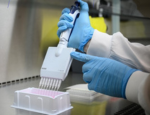 Genetic study shows that common medication used to prevent heart attacks may be ineffective for majority of British South Asians
Genetic study shows that common medication used to prevent heart attacks may be ineffective for majority of British South Asians
21 August 2023
A new study by researchers at Queen Mary University of London has found that a commonly prescribed medication used to prevent heart attacks is much less likely to benefit people of Bangladeshi and Pakistani ancestry, compared to people of European descent.
 Professor Morris Brown honoured by the Endocrine Society
Professor Morris Brown honoured by the Endocrine Society
17 August 2023
Morris Brown, Professor of Endocrine Hypertension at the William Harvey Heart Centre at Queen Mary University of London, will be honoured by the Endocrine Society as one of the 14 winners of its prestigious 2024 Laureate Awards.
 New research highlights inequities in blood pressure control
New research highlights inequities in blood pressure control
11 August 2023
A study of adults diagnosed with persistent high blood pressure (hypertension) has found that people who are younger or of Black ethnicity are less likely to have their blood pressure successfully controlled. This puts them at increased risk of heart attack and stroke.
 Genetic study of British South Asians challenges previous work linking statin use to increased cataract risk
Genetic study of British South Asians challenges previous work linking statin use to increased cataract risk
7 July 2023
New research, led by Queen Mary University of London, has unpicked the threads linking statin use, ethnicity and the risk of developing young-onset cataracts in British people with South Asian ancestry.
 New gene discovery in girls with central precocious puberty offers hope for diagnosis and treatment
New gene discovery in girls with central precocious puberty offers hope for diagnosis and treatment
5 July 2023
Analysis of international data from girls with idiopathic central precocious puberty helped researchers identify a genetic variant associated with the neurodevelopmental condition, Rett syndrome.
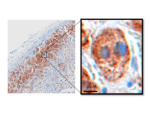 WHRI announces winners of 2023 Annual Research Review Image Competition
WHRI announces winners of 2023 Annual Research Review Image Competition
27 June 2023
William Harvey Research Institute at Queen Mary University is proud to announce the winners of the 2023 Annual Research Review Image Competition. This competition, which showcases the photography skills of staff and students, attracted a diverse range of captivating science and non-science related images.
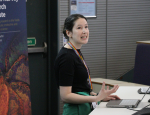 WHRI Annual Research Review 2023: Showcasing cutting edge-research and recognising excellence
WHRI Annual Research Review 2023: Showcasing cutting edge-research and recognising excellence
26 June 2023
William Harvey Research Institute at Queen Mary University of London recently hosted the Annual Research Review at the Derek Willoughby Lecture Theatre, Charterhouse Square on Wednesday 23rd June.
 Barts and Queen Mary Science Festival returns to Charterhouse Square
Barts and Queen Mary Science Festival returns to Charterhouse Square
23 June 2023
The Barts and Queen Mary Science Festival is an engaging event for secondary school pupils interested in science and medicine.
 New evidence supports sex-specific strategies to prevent heart attack and stroke
New evidence supports sex-specific strategies to prevent heart attack and stroke
15 June 2023
An observational study led by researchers at Queen Mary University of London has found that the influence of risk factors for heart attack and stroke vary significantly between women and men.
 Professor Márta Korbonits honoured with 2023 Laureate Award from Endocrine Society
Professor Márta Korbonits honoured with 2023 Laureate Award from Endocrine Society
15 June 2023
Márta Korbonits, Professor in Endocrinology and Metabolism at Queen Mary University of London has been selected to receive the prestigious Gerald D. Aurbach Award for Outstanding Translational Research from the Endocrine Society. This annual Laureate Award recognizes outstanding contributions to research that accelerate the transition of scientific discoveries into clinical applications.
-.jpg) Cause and cure discovered for common type of high blood pressure
Cause and cure discovered for common type of high blood pressure
12 June 2023
Clinicians at Queen Mary University of London and Barts Hospital have identified a gene variant that causes a common type of hypertension (high blood pressure) and a way to cure it, new research published in Nature Genetics shows.
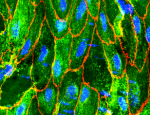 New study identifies the key role Neuropilin-1 plays in the prevention of cardiovascular disease
New study identifies the key role Neuropilin-1 plays in the prevention of cardiovascular disease
23 May 2023
Research from Queen Mary University of London, published today in the journal Science Signaling, provides new insights into the prevention of cardiovascular disease by shedding light on the previously unknown role of the protein Neuropilin-1.
 Previous cancer linked to long term heightened risk of cardiovascular disease
Previous cancer linked to long term heightened risk of cardiovascular disease
21 April 2023
UK Biobank study suggests a greater risk for blood and breast cancer survivors.
 An immunological basis of chronic widespread pain in fibromyalgia
An immunological basis of chronic widespread pain in fibromyalgia
19 April 2023
In a new study researchers from Queen Mary University of London demonstrate that neutrophils cause chronic widespread pain in fibromyalgia.
 Queen Mary researcher receives major funding award
Queen Mary researcher receives major funding award
30 March 2023
Philip Eaton, Professor of Cardiovascular Biochemistry at Queen Mary University of London, has been awarded €2.5 million by the European Research Council (ERC) to help tackle cardiovascular disease.
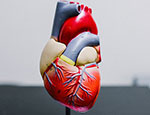 Largest ever genetic study of QRS-T angles may improve risk prediction for cardiovascular disease
Largest ever genetic study of QRS-T angles may improve risk prediction for cardiovascular disease
14 March 2023
A team of international researchers have performed the largest genetic analyses to date of electrocardiogram (ECG) measures associated with cardiovascular disease.
 Study reveals how changes in workplace support and leadership training can improve mental health and reduce burnout in healthcare professionals
Study reveals how changes in workplace support and leadership training can improve mental health and reduce burnout in healthcare professionals
28 February 2023
Amongst healthcare professionals, the feeling of being supported in the workplace can protect them against adverse mental health and burnout, according to a new study published in CMAJ Open by researchers at Queen Mary University of London and medical staff at various hospitals across the UK.
 Review calls for a refreshed look at clinical approach to heart muscle disorder
Review calls for a refreshed look at clinical approach to heart muscle disorder
9 February 2023
A global review of left ventricular non-compaction has called for future efforts to better understand the features of excessive trabeculation in the heart.
 UK’s first Semmelweis statue unveiled at the Faculty of Medicine and Dentistry, Queen Mary University of London
UK’s first Semmelweis statue unveiled at the Faculty of Medicine and Dentistry, Queen Mary University of London
18 January 2023
Queen Mary University of London and Embassy of Hungary in London mark the 204th birthday of Hungarian obstetrician responsible for identifying the cause of puerperal fever.
 Ten-minute scan enables detection and cure of the commonest cause of high blood pressure
Ten-minute scan enables detection and cure of the commonest cause of high blood pressure
16 January 2023
Doctors at Queen Mary University of London and Barts Hospital, and Cambridge University Hospital, have led research using a new type of CT scan to light up tiny nodules in a hormone gland and cure high blood pressure by their removal. The nodules are discovered in one-in-twenty people with high blood pressure.